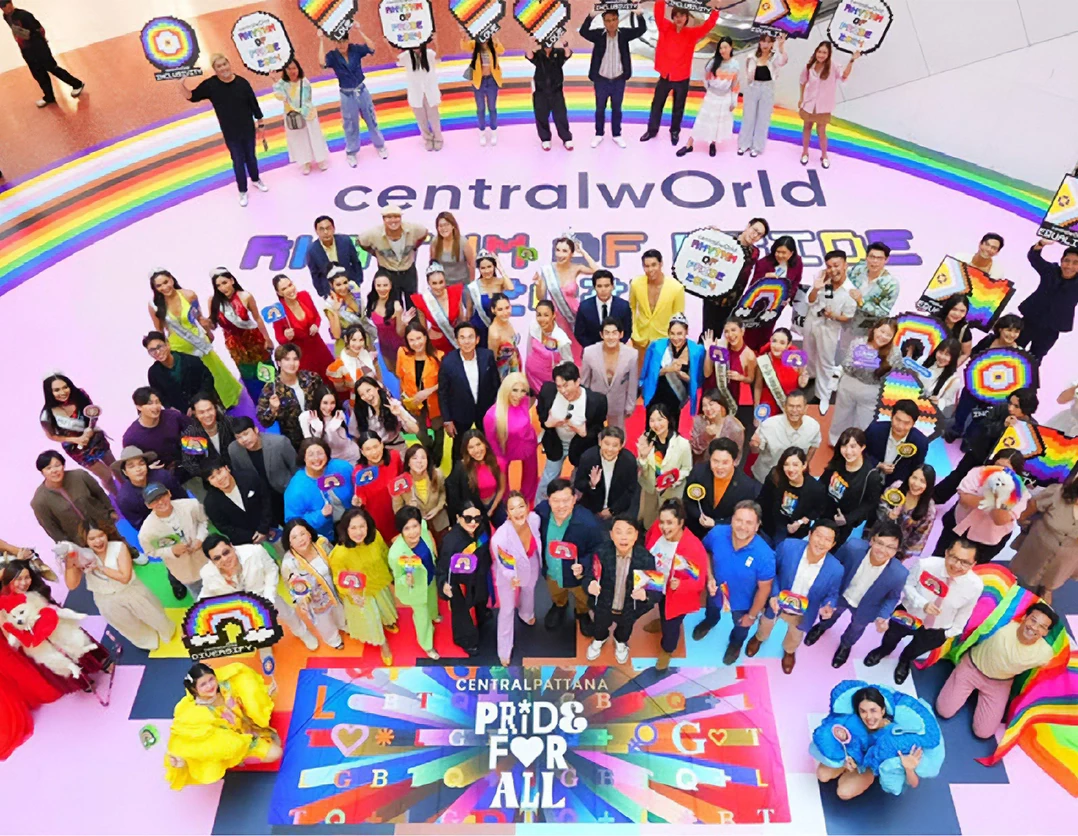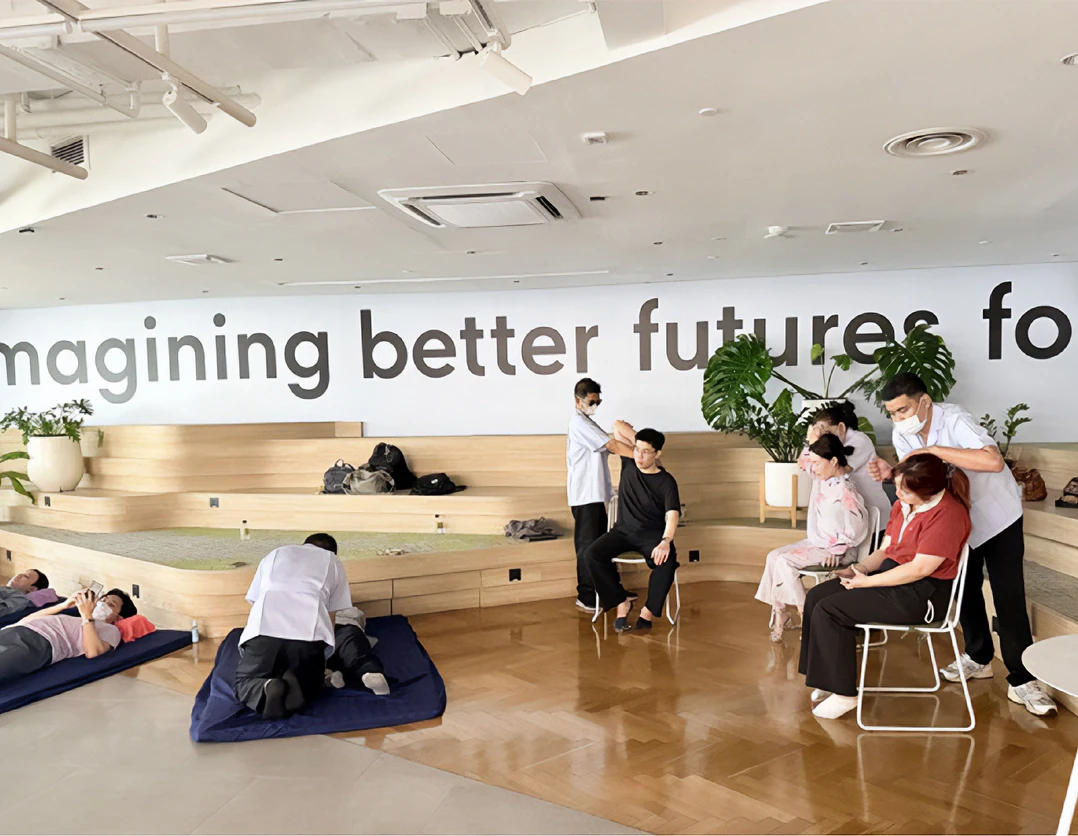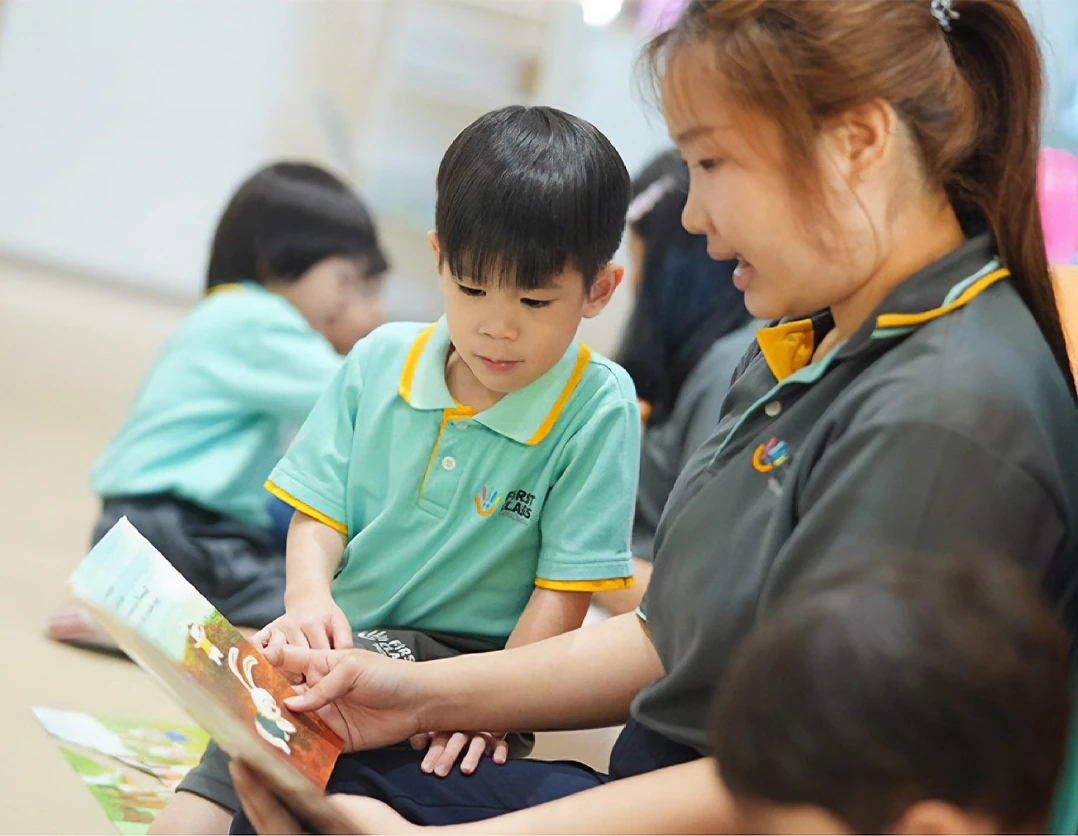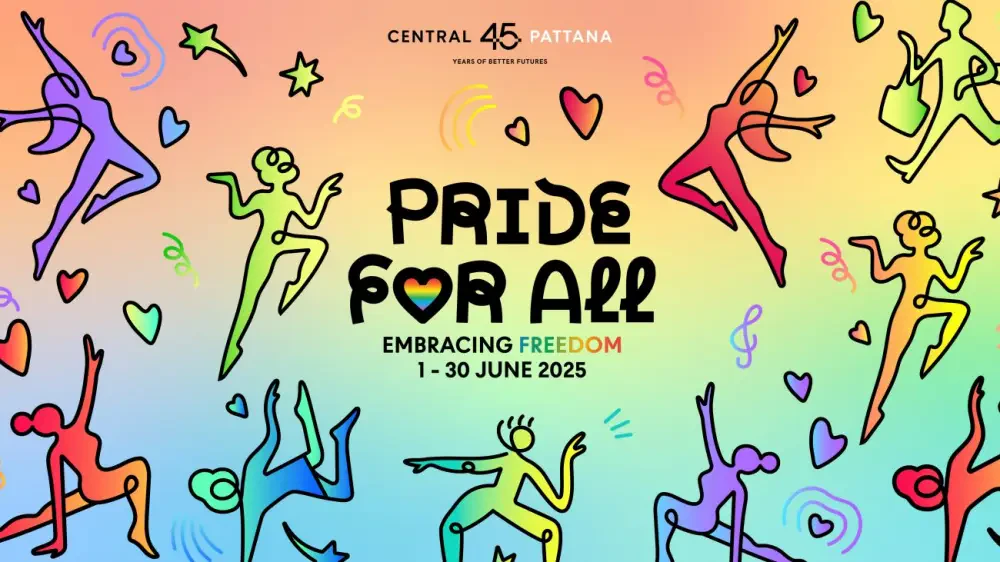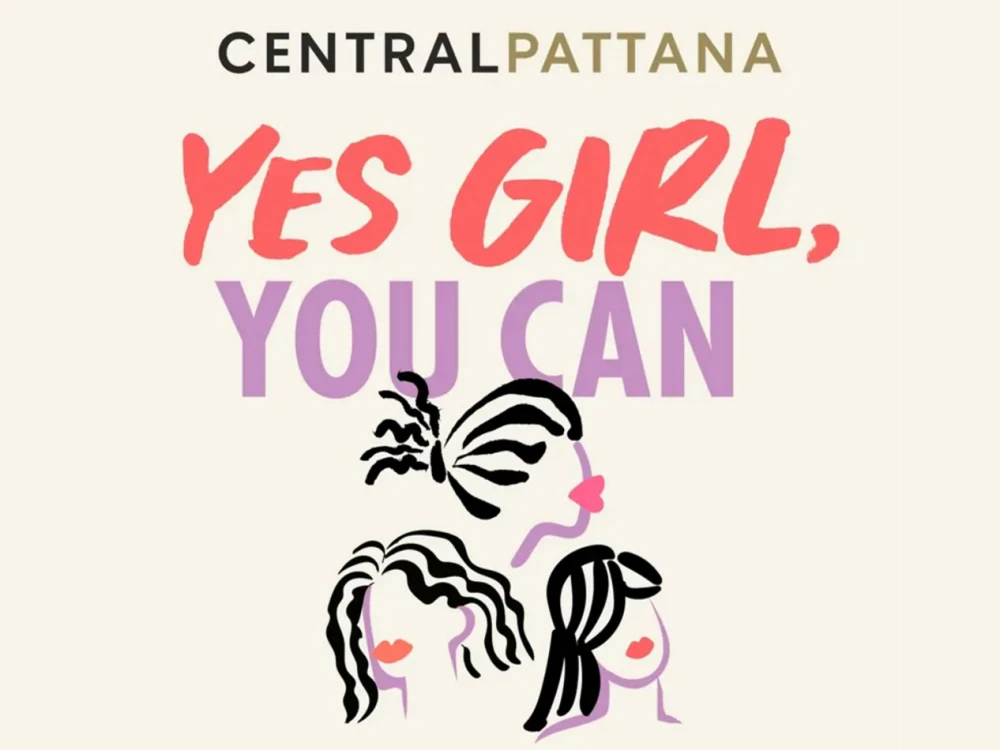
Human Rights
Goal and Performance Highlights

Performance
Goal
Challenges and Opportunities
With a diverse business portfolio spanning shopping centers, residential projects, office buildings, and hotels—and working with a wide range of partners and contractors—Central Pattana Public Company Limited faces both complexity and challenges in human rights management. A key issue is ensuring responsible practices across the supply chain, requiring close collaboration among all stakeholders. Managing a workforce with diverse backgrounds and needs is also a challenge that must be addressed to ensure equality and fairness. Furthermore, project development must consider community impacts to ensure that business growth remains balanced and sustainable. The protection of personal data for customers, tenants, and employees is another critical issue that must be managed rigorously in today’s digital age.
Amid these challenges, Central Pattana sees an opportunity to lead in human rights standards through strong policies and practices, underpinned by the use of technology and innovation to enhance governance—such as the adoption of transparent and accessible digital grievance platforms. Strengthening collaborations with government agencies, NGOs, and local communities will further reinforce labor standards and fair business conduct. With its firm commitment to human rights, the Company not only mitigates social and labor risks but also builds trust with stakeholders, enhances brand reputation, and supports long-term, sustainable growth.
Management Approach and Value Creation
Overview
Central Pattana Public Company Limited is committed to conducting business in alignment with international human rights principles. The Company’s Human Rights Policy has been in effect since 2020 and is reviewed at least every three years—the most recent update took place in 2024—to ensure alignment with evolving business contexts and stakeholder expectations.
Human rights practices cover all stakeholder groups, including employees, partners, subcontractors, customers, tenants, and communities. A dedicated Human Rights Working Team and Internal Audit Department oversee compliance, operating within the frameworks of the UN Guiding Principles on Business and Human Rights (UNGPs), the United Nations Global Compact (UNGC), and Thailand’s National Action Plan on Business and Human Rights.
Human Rights Due Diligence (HRDD) is conducted every two years, with a comprehensive assessment every four years, following methodologies from the UNGPs, Danish Institute for Human Rights (DIHR), and the HRIA Toolkit. In 2024, ten risk issues were identified, including three classified as Salient Issues. In response, the Company established preventive measures, remediation plans, and systematic monitoring mechanisms.
In addition, Central Pattana provides annual employee training on business ethics and human rights, and offers guidance to partners through handbooks and corporate communication channels to foster awareness and risk prevention across the supply chain.
Human rights grievances can be submitted via www.centralpattana.co.th/th/whistle-blowing, which ensures confidentiality and protection from retaliation. The Company monitors and reports grievance outcomes to the Audit and Corporate Governance Committee quarterly. In 2023, two human rights-related complaints were received and resolved within the designated timeframe.
Overall, the Company’s human rights strategy focuses on risk prevention, remediation for affected individuals, and the promotion of a corporate culture that respects everyone’s rights—raising standards to international levels and delivering long-term value to all stakeholders.
Respecting human rights in business promotes workplace equality and nurtures a work environment and culture of diversity, inclusion, respect and non-discrimination. This commitment enhances the well-being of employees, tenants and suppliers, and reduces human rights risks across the supply chain that, if unaddressed, could lead to resistance from employees, suppliers and customers, potentially causing business disruptions, reputational harm and a loss of stakeholder trust.
Management Approach
1. Operate in accordance with the Respect of Law and Principles of Human Rights Policy and embed respect for human rights into company policies including Treatment of Employees Policy, Supply Chain Management Policy, Treatment of Customers Policy, Occupational Health and Safety Policy, Public Relations and Marketing Policy as well as in our Code of Conduct and Corporate Governance Policy and Code of Conduct for Suppliers.
Our policies comply with applicable laws and regulations in all countries where we operate and align with international frameworks including the UN Guiding Principles on Business and Human Rights, United Nations Global Compact (UNGC), Universal Declaration of Human Rights (UDHR) and International Labor Standards (ILO) standards.
2. Create a safe and healthy work environment where everyone is treated fairly, equally and appropriately. Uphold the human rights of employees and stakeholders including customers, employees, tenants, tenant employees, suppliers, supplier employees, business partners and vulnerable groups, while remaining vigilant in ensuring that our business is not complicit in human rights violations and strictly adhering to all applicable laws, rules and regulations.
3. Carry out human rights due diligence (HRDD) every four years and human rights risk assessment (HRIA) every two years. Human rights risks are categorized and analyzed along the value chain including acquisition, design, construction, operations, and vulnerable groups. Each assessment cycle is guided by the Company’s policies and Code of Conduct, with adjustments made based on organizational context and feedback from previous assessments.
4. Impact classification and approach to mitigation and remediation
| Type of Impact | Mitigation and Remediation |
|---|---|
|
|
5. Review and assess human rights risks in operations across all business units and throughout the supply chain including during merger, acquisition, acquisition of shares, joint venture and other investment processes. This is fully integrated into the ESG assessment and embedded within the due diligence framework for mergers and acquisitions.
6. Adapt and apply globally accepted tools and frameworks in alignment with the UN’s Protect, Respect and Remedy framework, with reviews conducted annually to ensure ongoing compliance.
Key Outcomes and Achievements
1. We adopted the Human Rights Due Diligence (HRDD) for Listed Companies framework, developed by the Securities and Exchange Commission (SEC) in collaboration with the Faculty of Law, Chulalongkorn University, for the 2024-2025 assessment cycle. The assessment was conducted in two stages: small groups of experts identified significant human rights risks, which were then incorporated into an online questionnaire. The target population of the survey was defined as: all employees (including subsidiaries, joint ventures and affiliated companies), as well as outsourced workers (sampled). The assessment criteria and analytical framework were developed based on the UNDP - United Nations Guiding Principles on Business and Human Rights, the DIHR- Danish Institute for Human Rights, the Community Insights Group and HRIA Toolkit. A total of 23% of employees participated in the survey, achieving 230% of the target set.
2. The ten human rights risk issues identified from the online survey were analyzed together with the findings from the HRDD assessment, which highlighted eight issues (grouped by category). These were finalized as salient issues, outlined as follows:
- Human rights: Management of occupational safety, health and environment
- Labor rights and human rights: Respect, protection and promotion of equity, equality and non-discrimination, along with preventing the abuse of power.
- Labor rights: Freedom of association, collective bargaining and negotiation including the right to advocate for welfare and to report unfair labor practices
| Human Rights Issues | Implementation and Preventive and Corrective Action Plans |
|---|---|
|
|
|
In 2023, the Company conducted a human rights risk assessment for the 2023–2024 cycle, covering employees across all business units, subsidiaries, joint ventures, and subcontractors. The assessment was conducted through an online random sampling survey, with a response rate of 70% from the target sample group. The assessment identified nine human rights risk issues, three of which were classified as high-risk (Salient Issues). The Company developed risk mitigation plans as well as measures for prevention, monitoring, investigation, correction, and remediation in cases of rights violations. These processes were overseen by the Corporate Governance and Sustainability Communications Taskforce, the Occupational Health and Safety Working Group, and relevant responsible departments, ensuring compliance with the Company’s established procedures for investigation, prevention, resolution, communication, and follow-up.
| Identified as High Risk | Action Plans and Preventive/Corrective Measures | Performance Results |
|---|---|---|
| Physical and verbal harassment by external parties |
|
|
| Physical and verbal harassment by internal parties |
|
|
| Health and safety of employees and subcontractors at the workplace |
|
|
The Company continues to rigorously enforce and randomly inspect legal employment documentation at construction sites through its consultants and provincial labor offices, in accordance with the official labor registration and inspection procedures. All foreign workers must be legally registered and reported to each project’s management team. In 2023, foreign workers were registered at sites operated by 28 contractors (duplicate counts included), consisting of 17% Cambodian, 37% Myanmar, and 1% Lao nationals, while Thai workers accounted for 45% of the total workforce across all sites.
3. We structured our action plan into two parts: (1) mitigation actions to address salient human rights issues — specifically safety concerns in high-risk projects, which account for 28% of all shopping center and community mall projects; and (2) remediation actions for labor rights and human rights risks across the organization including high-risk supply chains, as identified through our assessments.
4. Oversight is provided by the Corporate Governance Communication and Sustainable Development Working Group, the Occupational Safety, Health and Environment Working Group, and other units responsible for audit and inspection. These teams ensure compliance with the Company’s procedures and protocols for investigation, prevention, resolution, communication and monitoring.
Human Rights Policy and Impact Assessment
Central Pattana Public Company Limited integrates human rights principles into all stages of its business operations—from recruitment and employee management to tenant engagement and the selection and oversight of business partners. The Company’s Human Rights Policy covers key issues including fair treatment, non-discrimination, workplace safety, freedom of association, and labor protection. To ensure compliance with its policy, the Company conducts Human Rights Due Diligence (HRDD) at least every two years. This assessment enables the Company to identify potential risks and develop appropriate measures to prevent and address human rights issues across all business operations. The process draws on stakeholder input alongside international standards.
-
Central Pattana conducts a comprehensive human rights audit every four years, with a risk assessment every two years based on the principles of the UN Guiding Principles on Business and Human Rights (UNGPs), the Danish Institute for Human Rights (DIHR), the Community Insights Group, and the HRIA Toolkit. The assessment covers the parent company, subsidiaries, and merged entities.
-
The scope of the Company’s human rights risk assessment includes:
- Freedom of association and collective bargaining rights, including the right to negotiate, organize, seek improved welfare, and report unfair labor practices through unions or welfare committees.
- Protection from forced or compulsory labor in all forms, such as coercive work conditions where individuals are unable to refuse or withdraw from work freely.
- Equality, equity, and non-discrimination, and the prevention of abuse of authority or misconduct by personnel in the workplace.
- Occupational health, safety, and working environment management in accordance with relevant standards and regulations.
- Prevention of child labor and protection of vulnerable groups such as persons with disabilities, ensuring that both the Company and its partners comply with legal and ethical labor standards.
- Personal data protection and rights to access information for employees and supply chain stakeholders, in compliance with the Personal Data Protection Act (PDPA).
- Respect for community and indigenous rights, including avoidance of land encroachment, displacement, or environmental degradation (e.g., pollution, wastewater, noise, dust, or waste) that may affect community livelihoods or professional activities.
- Prevention of human rights violations, including physical and verbal abuse based on gender identity, attire, beliefs, religion, etc., from any internal or external party—such as customers, tenants, contractors, or collaborating organizations.
- Water management practices that comply with environmental standards and safeguard the rights of other users, including the prevention of overconsumption and untreated wastewater discharge. The Company also requires partners to adopt responsible water use practices.
- Waste, pollution, and hazardous materials management that minimizes environmental impact through proper and efficient disposal methods.
Each assessment cycle aligns with the Company’s Human Rights Policy and Code of Conduct and is adjusted based on organizational context and feedback from previous years.
Impacts and Mitigation Measures are categorized and addressed in the following table
| Impacts | Mitigation Measure |
|---|---|
|
|
Human Rights Management in the Value Chain
For employees, Central Pattana Public Company Limited fosters a corporate culture of equality and inclusiveness through initiatives and policies that promote equal career opportunities. The Company encourages employee development and growth without limitations based on gender, age, race, or religion. In addition, health and safety at work are prioritized, with measures aligned with international occupational health standards, along with dedicated grievance channels for reporting human rights-related concerns.
For tenants and business partners, Central Pattana mandates that all related parties strictly adhere to human rights and labor standards through the Supplier Code of Conduct. This code outlines minimum standards for labor rights, prevention of child and forced labor, and the promotion of fair working conditions. The Company also conducts human rights training for business partners to enhance understanding and alignment with international best practices.
For communities, Central Pattana places great emphasis on building strong relationships with surrounding communities through initiatives that improve quality of life, such as supporting local entrepreneurs, job creation, and sustainable urban development.
Additionally, CPN designs accessible spaces that cater to all users, including the elderly and people with disabilities, helping to reduce inequality in access to retail and public areas.
Personal Data Protection and Cybersecurity
In the digital era, protecting the personal data of customers, tenants, and employees is a top priority for Central Pattana. The Company has implemented cybersecurity and data management measures in accordance with international standards, such as ISO 27001 and the Personal Data Protection Act (PDPA), to safeguard stakeholder rights. Furthermore, the Company has established a clear privacy policy and maintains secure, transparent channels for employees and stakeholders to report personal data issues.
Governance and Good Corporate Conduct
Central Pattana is committed to operating with transparency and good governance. The Company has established a dedicated Human Rights and Sustainability Governance Committee responsible for overseeing, monitoring, and reviewing human rights practices throughout the organization. This committee plays a crucial role in formulating and evaluating measures for the prevention and remediation of human rights issues, as well as reporting performance to the Executive Committee.
Human Rights Grievance Mechanism
The Company provides accessible whistleblowing and grievance channels for employees, partners, customers, and stakeholders throughout the value chain. These processes are governed to ensure confidentiality, impartiality, and effectiveness, along with protections against retaliation. Regular reports are submitted to the Audit Committee. The Company also assesses and analyzes human rights impacts across all levels of the value chain and carries out remedy and mitigation actions based on the principles of “Do No Harm” and “Remedy First.”
Towards a Human Rights-Respecting Organization
Central Pattana is firmly committed to responsible business practices that prioritize human rights, fairness, and transparency. These principles foster stakeholder trust and drive the organization toward stable and sustainable growth.
Key Initiatives
- Honored with the "Human Rights Awards 2024," winning Gold in the large business category for the first time. This recognition highlights Central Pattana's strong commitment to multi-stakeholder engagement through policies and an organizational culture that prioritize human rights. The award was presented by the Department of Rights and Liberties Protection, Ministry of Justice.
- Received the "Ardhanareeswara Award" for human rights advocacy in the private sector category. The award was organized by the Rainbow Sky Association of Thailand in collaboration with its civil society partners.
- Hosted the "Central Pattana x UNICEF: Human Rights Initiatives for Being Respectful Workplace" event, which featured a workshop led by UNICEF experts under the theme "Respectful Workplace: Safe at Work, Safe at Home." The workshop focused on building awareness of human rights, emotional well-being and mental health support, helping employees understand and manage both their own emotions and those of others to foster a respectful and supportive workplace culture. Over 50 employees participated in the event. In addition, stories from #TheSoundofHappiness campaign, created by UNICEF, the Department of Mental Health and JOOX, were promoted through the Company's internal communication channels.
- Organized the Central Group Corporate Governance Day, a panel discussion under the theme "WorkJoy: Sustainable Equality for a Happier Workplace." Experts from various companies within the Central Group shared their experiences in advancing human rights within their organizations. The event, open to all employees across Central Group companies, attracted 2,071 online participants (attendance for the human rights session only).
- Hosted Thailand's Pride Celebration 2024 "Pride For All," a nationwide Pride Month event held at Central shopping centers with more than 46 events across 20 provinces. Now in its fifth year, the celebration also supported Thailand's bid to host World Pride 2030 and showcased the country's pride in being the first in Southeast Asia to legalize marriage equality. The event was promoted through all of the Company's communication channels.
- Provided free space for people with disabilities to legally sell lottery tickets, prioritizing their needs and well-being. In 2024, 46 individuals participated in the program, representing 0.6% of the company's total workforce and generating a social value of Baht 7.9 mn.
- Employed visually impaired individuals to provide monthly massage therapy services for employees, with a total of 15 therapists hired. This service is also available to on-site supplier employees including cleaning staff and security personnel.
- Supported children's right to education by launching a new business, "First Class Preschool," a bilingual early childhood development center at Central Westville. The program focuses on developing essential skills for children aged 1-6-promoting identity development, executive functions (EF), positive discipline, holistic growth and communication skills in both languages-laying a strong foundation for future success and well-being.
- In collaboration with the social enterprise 'Young Happy' and the Suthirat Yoovidhya Foundation, we promoted the rights and value of senior citizens by hosting the 'Eldergy Festival: Boosting Elderly Power' at Esplanade Ratchada. The event aimed to empower seniors, enhance their self-worth and highlight their role in driving social change under the theme 'Fun, Valuable, and Independent.' It featured various zones including: Fun Zone - mini concerts, workshops and activities, Valuable Zone - an exhibition on elderly empowerment and their role in urban social change, presented by Suthirat Yoovidhya Foundation, and Independent Zone -a senior market offering affordable products and career development opportunities.







